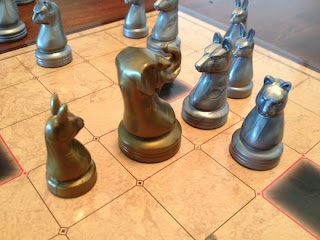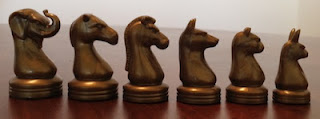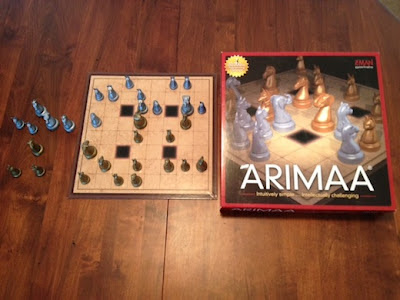A while back, I did a top ten abstract board games list. One of the comments spoke incredibly highly of an abstract that I hadn't tried yet - Arimaa. So, of course, I hunted down a copy and tried it out!
In Arimaa, the goal of the game is to get one of your rabbits onto your opponent's edge of the board. To start the game, you have an elephant, camel, two horses, two dogs, two cats, and eight rabbits (listed in order of power). Each player can set these pieces up however they choose along the two rows closest to them. Then, on each turn, players can make up to four total moves. A move is always orthogonal (not diagonal), and these moves can be split up among as many pieces as you would like. There are two special moves (that require two movement points) - you can push or pull an opponent's piece. To do either of these moves, your piece must be stronger than your opponent's. To push, you simply move your opponent into any unoccupied space adjacent to their current position and place your piece where they just vacated. To pull, you move your piece to an adjacent vacant space and move their piece to the spot you just vacated. These moves are especially important, as there are four black hole spaces on the board - if you push your opponent onto one of them, then they lose that piece. Two more special rules - rabbits cannot move backwards, and a piece adjacent to an opponent's stronger piece is "frozen" and cannot move (unless the piece is also adjacent to a friendly piece). Players alternate turns of four moves until one rabbit has crossed the finish line! Or, until one person has made so much rabbit stew that their opponent no longer has any rabbits to attempt to win with.
 |
| Elephant getting ready to cause havoc |
The next element of Arimaa that I enjoyed was the black hole spaces. I really thought that this was a nice way of capturing pieces. Again, I will compare this to Chess, as Arimaa naturally gets that comparison (you play it on the same sized board, and with the same number and breakdown of pieces - in fact, you can use an Arimaa set as a Chess set if you prefer). In Chess, you simply have to land on an opponent's piece to capture them. I like that in Arimaa, it requires a bit more effort. The push or pull requires two movement points each. Plus, if the target is not adjacent to the black hole to begin with, it may require two push/pull maneuvers to capture a piece. However, even with that extra effort, it still does not necessarily cost your entire turn to capture a single piece - you may be able to push a piece into the black hole, and then still have two movement points remaining that you can use elsewhere. I really liked how the capturing worked here. Another reason that this worked so well is that the black hole spaces are positioned on the board so that a piece is never very far away from one. So, if you're not paying attention, you can lose a piece on almost any turn.
 |
| Pieces in order of power |
My fourth pro for Arimaa is that I like the freedom that the game allows. I like that you can setup your pieces however you want, and that you can split your movement points up among different pieces. However, possibly due to this freedom, I must share my sole con for the game: players that are prone to think for long periods of time can make the game drag. This is true in a lot of abstract strategy games (since the entire game is visible in front of you, if you can outthink your opponent, there is nothing that can stop you). However, I have discovered that the more a game resembles chess, the longer that players will sit around and think. And, Arimaa resembles Chess a lot (in looks, not in gameplay). So, this is just something that you should be aware of - if your opponent likes to sit and think, then be prepared to have quite a bit of down time.
Overall, I give Arimaa a 9.0/10. I really enjoyed the game, and I think that it is a beautiful example of an abstract strategy. The motto of the game is "intuitively simple� intellectually challenging", and I would have to agree with this. I would highly recommend that anyone that enjoys abstract strategy games try out Arimaa.
If Arimaa sound interesting, you might also want to check out Ploy, Gipf, and Brandubh.



0 komentar:
Posting Komentar